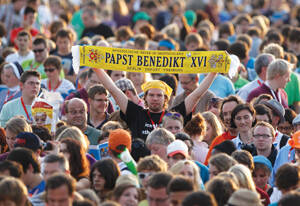On his first state visit to his German homeland, Pope Benedict XVI warned that godlessness and religious indifference were undermining the moral foundations of society and leaving its weakest members exposed to new risks. At a welcoming ceremony at the presidential Bellevue Palace in Berlin, the pope strongly defended the church’s voice in public affairs. He said that to dismiss religious values as irrelevant would “dismember our culture.” During his four-day visit, Pope Benedict repeatedly mentioned the duty to protect the unborn and proposed this as an area where Catholics and non-Catholics can work together.
The preferential treatment given the pope provoked some complaints from German politicians and a few protests. A speech in Berlin before the German Parliament was boycotted by some members. The pope told German politicians that belief in God was the foundation for Western progress in law, social justice and human rights through the centuries. Germany’s Nazi past, he said, illustrates that without justice the state becomes “a highly organized band of robbers, capable of threatening the whole world and driving it to the edge of the abyss.” Today, he said, with unprecedented opportunities to manipulate human beings, the threat is even more dramatic. He pointed to Germany’s ecology movement as a step in the right direction. (A Green Party politician had made a point of walking out as the pope began to speak.) Pope Benedict said an “ecology of man” was needed to protect human dignity.
Meeting on Sept. 25 with about 1,500 Catholics involved in church ministries, lay movements and civic, political or social activities, he pondered how the church might respond to self-inflicted wounds like the sexual abuse crisis and the decline of its membership in Germany. “Should the church not change?” he asked. “Must she not adapt her offices and structure to the present day in order to reach the searching and doubting people of today?”
Change is needed constantly, but change must begin with the individuals who make up the church, he said. And changes must be dictated by the Gospel, not the world. In fact, to carry out her mission, the church “will constantly set herself apart from her surroundings; she needs in a certain sense to become unworldly or ‘desecularized,’” he said.
“History has shown that when the church becomes less worldly, her missionary witness shines more brightly,” Pope Benedict said. “Once liberated from her material and political burdens, the church can reach out more effectively and in a truly Christian way to the whole world; she can be truly open to the world.”
Celebrating Mass in Berlin’s Olympic Stadium for 70,000 people, the pope appealed for a better understanding of the church, one that goes beyond current controversies and the failings of its members. On the plane carrying him from Rome, the pope told reporters he understood the feelings of German Catholics who have left the church because of revelations about sexual abuse by clerics, but he urged them to work against such crimes “on the inside.” The pope later met with five sexual abuse victims in Erfurt, an encounter that the Vatican said left the pontiff “moved and deeply shaken.”
Meeting with Lutheran leaders on Sept. 23 in Erfurt, the town where Martin Luther was ordained, the pope prayed for Christian unity and said ecumenism today faces threats from both secularization and Christian fundamentalism. “God is increasingly being driven out of our society.... Are we to yield to the pressure of secularization and become modern by watering down the faith?” he asked.








